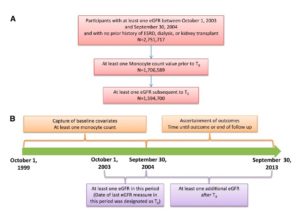
TingTing Li, MD
Associate Professor of Medicine Tingting Li, Division of Nephrology at WU, and colleagues from the Clinical Epidemiology Center at the VA Saint Louis Health Care System participated in the recently launched CJASN Podcast to discuss their publication Association between Monocyte Count and Risk of Incident CKD and Progression to ESRD.
Dr. Li, first author and statistician Benjamin Bowe, MPH, and senior author Ziyad Al-Aly, MD, presented their findings that circulation blood monocyte count, a widely available biomarker, is a significant predictor of kidney disease development and progression.
Monocytes, key constituents of the immune system, play a major role in the initiation, propagation, and progression of atherosclerosis. Studies suggest that monocyte count may be a predictor of atherosclerotic vascular disease. In addition, studies show an association between higher monocyte counts and certain measures of renal function. However, the relationship between monocyte count and risk of CKD development and its progression to ESRD was not known.
 The team of the CJASN publication followed a cohort of more than 1.5 million United States veterans with no prior history of ESRD, dialysis or kidney transplant, for an average of 9.2 years. They found a graded association between monocyte count and the risk of development of CKD, risk of CKD progression, and risk of ESRD. While the mechanism behind this association is not clear, it is possible that the monocyte count may be a surrogate marker, or clinical predictor, of inflammation and overall poorer health, and therefore higher adverse long-term renal outcomes. Future studies are needed to determine which monocyte subtype will best predict renal outcomes.
The team of the CJASN publication followed a cohort of more than 1.5 million United States veterans with no prior history of ESRD, dialysis or kidney transplant, for an average of 9.2 years. They found a graded association between monocyte count and the risk of development of CKD, risk of CKD progression, and risk of ESRD. While the mechanism behind this association is not clear, it is possible that the monocyte count may be a surrogate marker, or clinical predictor, of inflammation and overall poorer health, and therefore higher adverse long-term renal outcomes. Future studies are needed to determine which monocyte subtype will best predict renal outcomes.
Read the full article in CJASN here and listen to the podcast here. The CJASN podcast was launched in January of 2017 to coincide with the start of the journal’s new Editor-in-Chief Rajnish Mehrotra, MD. The podcast appears online simultaneously with the journal’s monthly issue.